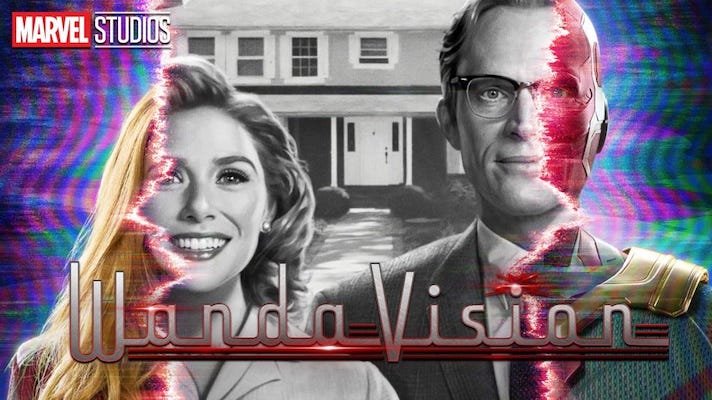Want an episode-by-episode breakdown? Read Tyler’s reviews on every episode!
In the early days of its broadcast, people were likening WandaVision to the works of David Lynch. The kind of dark suburbia, everyone-is-acting-kind-of-off, bigger-things-happening-behind-the-scenes mixed in with a lot of classic Americana. Little did we know that the show would have one more thing in common with some of Lynch’s work: disappointing payoffs.
But for now, let’s start with a story.
Once upon a time, a witch and a robot fell in love. Then the witch had to kill the robot in order to save the world. Too bad their sacrifice wound up being useless. The witch returned, but the robot did not. Or so it seemed because now the witch and the robot are living out their days in suburbia in the 1950s. Or is it the 1960s? The 1970s? Why did a beekeeper just pop out of that sewer?
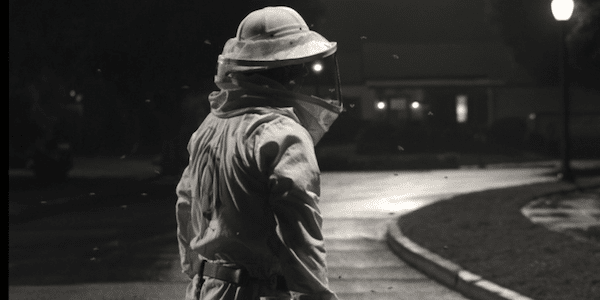
WandaVision was a show that started with more questions and answers and rest assured, most get answered. But, unfortunately, they’re not exactly all answered well. At first, it’s clear that something more is going on beside the improbably alive Vision living with his no-longer-vaguely-East-European-accented wife, Wanda. No talk of the Avengers, of Ultron, of Thanos, just wacky hijinks of the typical sitcom variety. What I am saying is this is all very un-Marvel. And that’s a big part of the charm, bringing something different and strange to the canon. It does end up shifting to something more conventional, which isn’t a bad thing. WandaVision is a show very much in its own league and proves that Marvel’s habit of taking risks allows for incredible and unique stories to be told.
It’s very clear that the people who put together this show, from creator Jac Schaeffer, director Mark Shakman, the writers, the costume and set designers, the actors, love these classic shows. The parodies of The Dick Van Dyke Show, Bewitched, The Brady Bunch, Family Ties, Malcolm in the Middle, and Modern Family are excellently done. The way the house, and the town of Westview, progressively shifts from decade to decade is amazing, from the iconic stairs to the different furnishings. And the way the costumes shift to evoke the different eras of TV is truly inspiring. The music needs a special shout-out, with Kristen Anderson-Lopez and Robert Lopez working on the different theme songs for the shows that are all pitch-perfect homages.
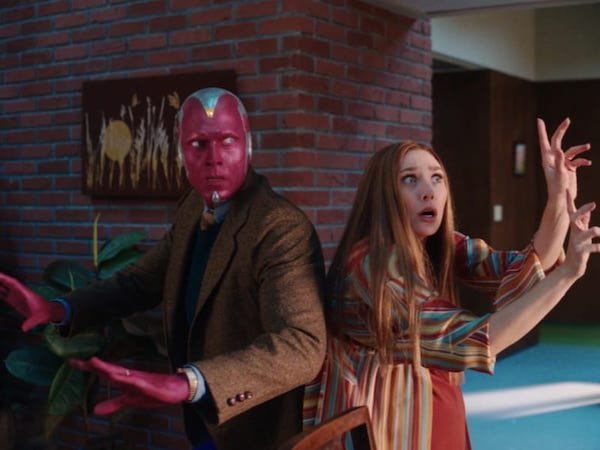
Elizabeth Olsen deserves a lot of accolades for her portrayal of Wanda Maximoff. She is perfectly able to pull off the cutesy American housewife and the grieving superhero, sometimes in the same episode. The subtlety and range of her emotions are deeply felt, and her comedic timing is great, which makes her the perfect fit for this kind of show. Let’s not forget Paul Bettany, who it turns out is a real comedic talent and brings so much more personality to Vision than the MCU movies allowed him to, but without sacrificing that emotional core. Seriously, these two have some of the most romantic scenes I’ve said in any media, and I totally foresee people tattooing “what is grief, if not love persevering” on themselves.
The trio of Monica Rambeau (Teyonah Parris), Darcy Lewis (Kat Dennings), and Jimmy Woo (Randall Park) really tied together the B plot. They made a great team, and I wanted the show to spend more time with them. Rambeau plays a bigger part in the story, though I feel like her character arc did not get the time and attention it needed towards the end of the show. I get she will have a bigger part to play in the MCU, but it felt like a lackluster effort. And we could always use more Kat Dennings, always.
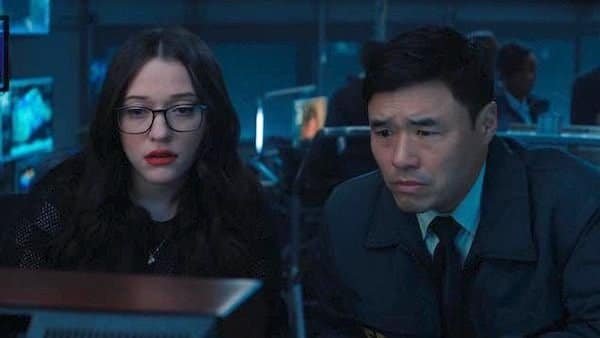
But the surprise MVP is Kathryn Hahn, who plays the recurring character Agnes, a noisy neighbor who turns out to play a huge role in the story. Her charm is undeniable, and the dead-eyed cheer she’s able to portray as things get weirder and weirder is so unsettling good. But that all pales in comparison to when she reveals her true nature as the show’s villain.
But not all things in Westview were good, but to go into that, we’ve got to head into heavy spoiler territory.
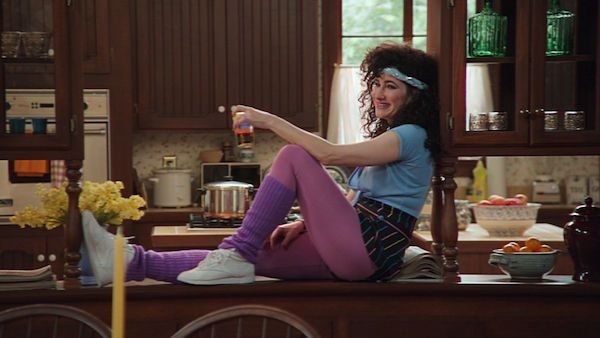

I feel like the show had way too many red herrings. For example, “Pietro” seemed like a nod that maybe we’d be more of the Fox mutant characters, but it ended up just being a long-game ending in a dick joke. There were a lot of teases about big characters and reveals that never really came, and because of that, there was a lot of speculation that ended up going nowhere. People thought Dottie’s yellow roses meant she was Arcana. People thought the bunny from episode 2 (and about ninety other things) had something to do with Mephisto, and on and on till the theories almost overtook the actual show.
It might be an unpopular opinion, but I think Hayward, in general, was a waste. He is clearly a villain from the get-go, and he is caught quickly and easily. It was a great moment, sure, but the impact overall was nil. And we never get any motivation for why he hated Wanda so much. Originally, it was because she had Vision, but that point is moot when it is revealed he already had Vision’s corpse.
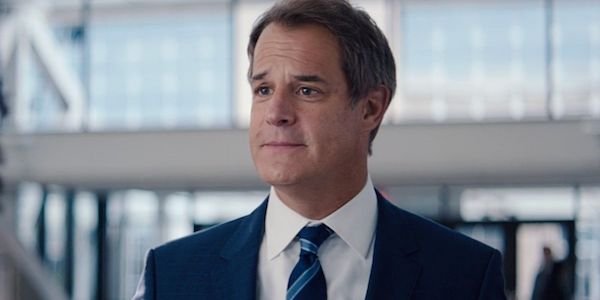
The biggest issue is that the final episode was no able to stick the landing, so to speak. It’s almost hard to blame the show for it, though. COVID-19 threw everyone off and messed the production schedules up, so maybe there was a slightly more elaborate ending all along. But there’s just something about the final episode that feels like it’s lacking. Monica, despite being such a central figure and gaining powers, has very little to do in the final episode. A gift to the MCU, a.k.a Dr. Darcy Lewis, isn’t given much to do either. Agatha ends up dispatched relatively easily, which is disappointing given all the build-up of her as a major villain. But it makes sense given that they needed to give Wanda enough time to say goodbye and thoroughly break our hearts.
What the ending does do is bring a successful yet emotional closure to Wanda’s story, where she says goodbye to Vision and her children. A closure that feels a little undercut by one of the after-credits scenes when she is revealed to be reading the Darkhold and hears her children calling for her. Still, the scene in which Wanda and Vision say goodbye is beautiful and really highlights just how perfect Olsen and Bettany are for these roles and the amazing chemistry they have.
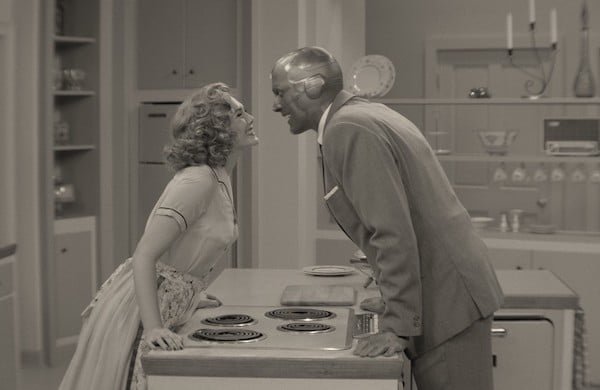
We do have a few questions left over. Who is Jimmy Woo’s witness protection person in Westview? Were the engineers that helped Monica, also the Skrulls? Is Wanda going to face any consequences for having held an entire town hostage for several days? Who’s going to pay for all that therapy? Where the hell did White Vision go, and is he going to be coming back for future Avengers projects? Where did Darcy go, and when can we get more of her signature sass?
There are also bigger questions about how this will play into the larger narratives of Phase 4, which WandaVision has kicked off. Wanda is set to come back in Dr. Strange and the Multiverse of Madness, so will she eventually find her kids? And is that a setup for Young Avengers?
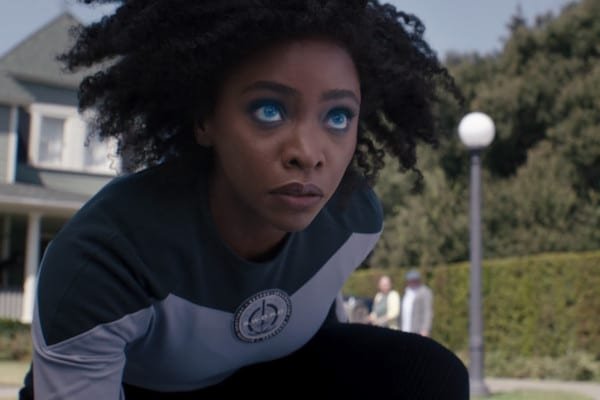
I will say that I am not sure how well this show works as a binge, given that much of the fun is enjoying the ride and sorting through the clues while you wait. But then again, I think that the narrative as a whole is strong enough to pull it through and might even soothe the sting that is the disappointing final episode.
Summary
WandaVision is an excellent show that starts strong and unfortunately fails to stick the landing. The acting is superb, the look and sound of the show goes above and beyond, and was the strongest kickoff to the MCU’s line of TV shows possible. Come for the mystery, stay for the heart.


